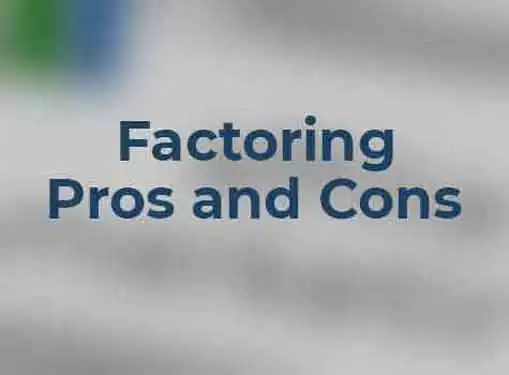Business Finance
The Pros and Cons of Factoring
Written by Chris Martin for Gaebler Ventures
If an entrepreneur high is billing orders but is experiencing cashflow problems because of clients who are tardy on paying their invoices, they may turn to factoring. Companies who provide factoring agree to pay business owners for their accounts receivables at a discount. But is factoring a good solution?
In a tight economy, it can often be difficult for entrepreneurs to secure the credit or loans that they need to grow their businesses.

Banks and other financial institutions often curtail their lending to small business owners, especially when it comes to short-term loans. This can leave an entrepreneur high and dry if he or she is billing orders but is experiencing cashflow problems because of clients who are tardy on paying their invoices.
As a result, some of these entrepreneurs turn to factoring.
Companies who provide factoring agree to pay business owners for their accounts receivables at a discount. This gives entrepreneurs money in the bank instead of invoices, allowing them to meet payroll, pay their suppliers, or grow their business. In return, the factoring company collects the full amount of the receivables whenever they are paid off, thereby turning a profit. In addition, companies can sell their outstanding accounts to factoring firms on a month-to-month basis with no long-term commitments required.
Sounds like a win-win situation, right? Not necessarily.
For one thing, the rates of factoring are usually much higher than comparable bank loans. It's not uncommon for factoring companies to charge 3% to 7% or more on a given contract, which can add up to a large chunk of lost revenue over an extended period of time. Plus, factoring companies are not subject to the federal regulations or oversight that banks and lenders are. This creates the possibility of unscrupulous individuals getting into the factoring business and taking advantage of desperate business owners.
So what should you do if factoring is the best option for keeping your business afloat?
Here are some things to consider before signing any factoring contracts:
Peruse the contract carefully. Make sure you know the duration of the deal. Check to see if there are sales minimums and maximums which you must adhere to. Determine if you need to provide a personal guarantee to the factoring firm that allows it to take possession of your assets if the receivables are never paid off. Figure out if you are required to factor all of your receivables or if you can just sell the ones that are problematic.
Consider negotiating. See if the factoring firm will lower your rate in exchange for a longer contract, more accounts, etc. Some companies don't negotiate factoring rates at all, but you will never know unless you ask.
Investigate the factoring company. Find out where its home base is, how long it has been in business, and who is on its management team. Use web searches to see if the firm comes up on any complaint lists or lawsuit databases. Don't be afraid to ask for referrals.
Map out an endgame. Before you sign your first factoring agreement, it is vital that you determine when you think your cashflow will turn around and what you must do to achieve that goal. Otherwise, you risk falling into the habit of selling your receivables month after month without making any headway on your underlying liquidity problems. This could become a vicious cycle - much like repeatedly getting high-interest payday loans in a vain attempt to pay off perpetually-growing debt.
A good rule of thumb is to rely on factoring for no more than a year or two at most. If you still have cashflow issues when you reach that point, then perhaps you should consider shrinking your business or closing it altogether.
Factoring is like any other financial service on the market: it can provide positive results when used wisely and in moderation. But it is not a long-term solution for fundamental liquidity or revenue-generation problems.
Chris Martin has been a professional writer for the last seven years. He is interested in franchises and equity acquisition.
Share this article
Additional Resources for Entrepreneurs

Conversation Board
We greatly appreciate any advice you can provide on this topic. Please contribute your insights on this topic so others can benefit.